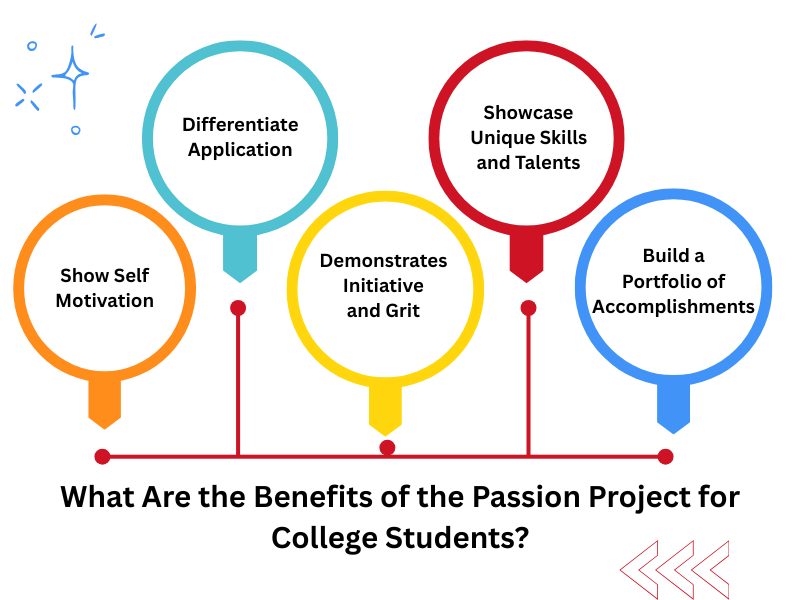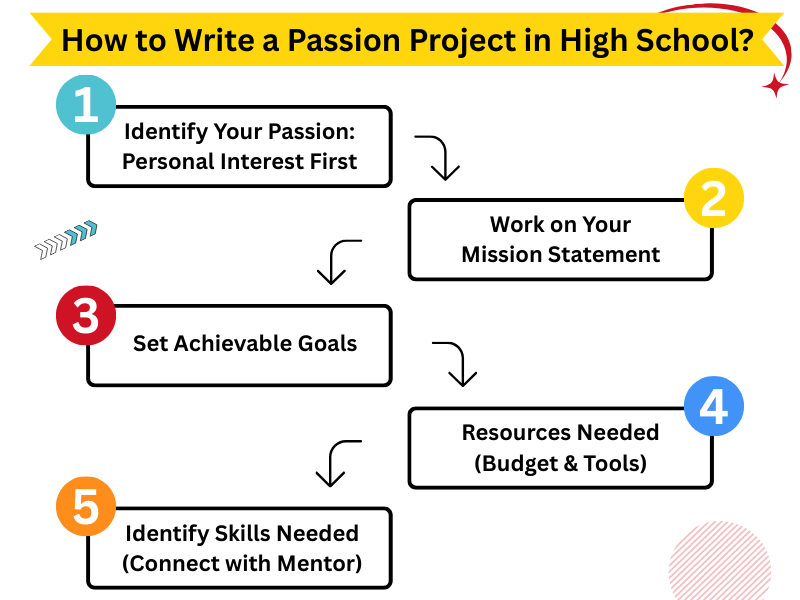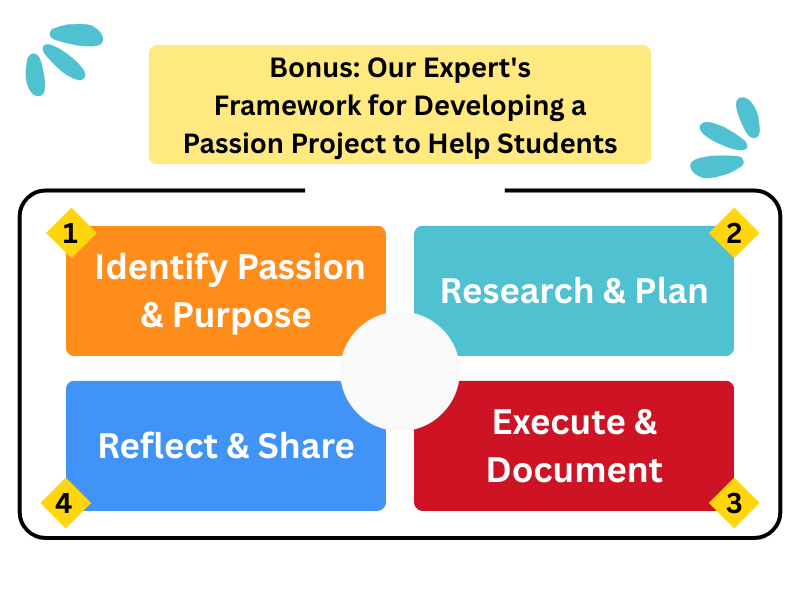According to a study cited by the mentorship organization Acceptitas, over 75% of current Harvard students completed a passion project in high school. Admissions officers value these projects because they reveal your character, intellectual curiosity, and potential to contribute meaningfully to campus life. While these projects require extensive research, the most essential part is identifying the perfect idea that aligns with your academic or career goals and yields a tangible outcome, such as a research paper, a community event, or a developed application.
Therefore, we have a list of 100 passion project ideas to help smooth your journey. This detailed guide includes:
- What are Passion Projects?
- What are the various types
- How does it benefit your college admission
- The strategic importance of the passion projects
- How to Select the Topic
- How to Develop Your Project.
Furthermore, read on to get a bonus gift: Experts’ Secret Framework of Passion Project for Success.
Table of Contents
What Are Passion Project Ideas?
A passion project is fundamentally a personal undertaking that a student pursues out of a strong interest or curiosity in a specific topic, skill, or cause. It is not tied to any formal academic or professional requirement.
Therefore, since these projects are self-directed and independent initiatives undertaken by students, they often span a wide range of fields, including research, arts, technology, community service, and entrepreneurship, and are completed during the summer.
Passion project ideas for high schoolers, particularly those aiming for admission to selective universities, have become a critical component of a competitive application profile.
What Are the Types of Passion Projects?
| Category | Description | Examples |
|---|---|---|
| Arts & Crafts | Projects that showcase your talent, creative writing, and personal expression. Ideal for students interested in humanities, design, or fine arts. | Create a documentary, start a blog, design sculptures from recycled materials, paint a mural, organize a community theatre production, or host a photography exhibition. |
| Technology & Innovation | Projects that aim to prove or establish technical skills and the ability to leverage technology to solve problems. Ideal for students pursuing STEM fields. | Design a mobile app, build a website, create a video game, develop a machine learning algorithm, invent a STEM-themed board game, and learn a new programming language. |
| Writing & Literature | Projects for aspiring writers and communicators, demonstrating analytical and storytelling skills. Relevant for linguistics, marketing, and literature. | Write and publish a novel or poetry collection, start a literary magazine, create a podcast on current events, translate a classic work, or write a script for a short film. |
| Community & Nature | Projects focused on community service, environmentalism, and political advocacy. They show commitment, character, and leadership. They also illustrate that you take initiatives and take ownership to make a positive impact. | Start a non-profit, organize a food or book drive, start a community garden, volunteer at an animal shelter, campaign for political change, test local water quality. |
| Health & Wellness | Projects that prove or establish a commitment to health, medicine, and well-being. Highly relevant for future medical and healthcare professionals. | Create a mental health awareness campaign, develop a mindfulness podcast, volunteer in a healthcare setting, conduct a medical research project, and organize blood drives. |
| Business & Leadership | Projects that showcase entrepreneurial spirit and practical business acumen. Ideal for students interested in business, economics, or finance. | Write a business plan for a startup, create an Etsy shop, conduct an internship or job shadow, analyze a business issue, or start a tutoring business. |
| Public Speaking & Debating | Projects that develop and prove or establish strong communication and argumentation skills, relevant for politics, law, and communications. | Start a debate-focused YouTube channel or podcast, organize a speech competition, volunteer for a political campaign, or apply for the TED-Ed Student Talks programme. |
| Research | In-depth academic projects that show serious engagement with a specific field of study and prove or establish a high degree of initiative. | Complete a research project with a professor, write a paper for a journal like the Concord Review, or study data trends (e.g., on Billboard charts). |
11 Arts and Crafts Passion Project Ideas for High School Students
1. Create a Graphic Novel or Comic Series: Develop a story, design characters, and illustrate a multi-chapter graphic novel. This project can be completed digitally or traditionally, showing storytelling and visual art skills.
2. Start a Digital Art Portfolio: Curate a collection of your best digital artwork, showcasing a range of styles and techniques. You can use platforms like Behance, ArtStation, or your own personal website.
3. Design and Build Custom Furniture: Utilize woodworking or other building skills to design and craft a one-of-a-kind piece of furniture, such as a coffee table, bookshelf, or chair.
4. Launch a Photography Blog or Instagram Account: Dedicate an account to a specific type of photography (e.g., street photography, nature, portraits) and consistently post high-quality work with thoughtful captions.
5. Curate an Art Exhibition: Collaborate with a local gallery, school, or community center to organize and showcase an art exhibition featuring your own work, artistic flair, or that of other student artists.
6. Create a Community Mural: Design and paint a mural on a wall in your school or neighborhood. This project requires collaboration, planning, and a deep understanding of scale and public art.
7. Produce a Stop-Motion Animation Film: Write a script, build characters and sets, and create a short film using stop-motion animation techniques.
8. Design and Sew a Fashion Collection: Develop a theme, sketch designs, select fabrics, and sew a small collection of clothing items.
9. Build a Website Portfolio for a Local Artist: Offer to design and build a professional portfolio website for a local artist. This proves or establishes web design, project management, and collaboration skills.
10. Explore Sculpture and Mixed Media: Create a series of sculptures using unconventional materials or a mix of different media to explore a specific theme or concept.
11. Create a Zine or Mini-Magazine: Design, write, and illustrate a small, independent magazine or “zine” on a topic you’re passionate about, such as local music, independent film, or a niche hobby. Always put your personal interests first.
Tech and Innovation: 12 Passion Project Ideas for High Schoolers

2. Build a Smart Home Device: Use a microcontroller like Arduino or Raspberry Pi to create a device that automates a task in your home, such as a smart lighting system, an automated plant watering system, or a security camera.
3. Create a Website for a Local Business or Non-Profit: Offer to design and build a professional website for a small local business or a cause you support. This shows your coding and project management skills.
4. Start a YouTube Channel on a Tech Topic: Create educational videos about a specific area of technology you’re passionate about, like coding tutorials, product reviews, or deep dives into cybersecurity.
5. Develop a Video Game: Use a game engine like Unity or Unreal Engine to design and build a simple video game.
6. Explore Machine Learning: Train a machine learning model to solve a real-world problem, such as classifying images, predicting stock prices, or analyzing data from a specific field.
7. Build a Robot: Use robotics kits or 3D printing to design and build a robot that can perform a specific function, like navigating a maze or picking up objects.
8. Create a 3D-Printed Design Project: Learn 3D modeling and create a useful or artistic object that you then 3D print, such as custom phone cases, parts for a machine, or decorative items.
9. Contribute to an Open-Source Project: Find an open-source project on GitHub that interests you and contribute to its development by fixing bugs, adding new features, or improving documentation.
10. Start a Tech Blog: Write articles and tutorials on a specific tech niche, such as web development, AI, or cybersecurity. This proves or establishes your expertise and communication skills.
11. Build an E-Commerce Website: Use platforms like Shopify or learn to code a basic e-commerce site from scratch to practice web development and business skills.
12. Design and Build a Wearable Device: Create a piece of wearable technology, such as a fitness tracker or smart clothing, utilizing microcontrollers and sensors.
11 Writing and Literature Passion Project for High School Students
2. Start a Literary Magazine: Curate and edit a literary magazine featuring work from other high school students. This shows leadership, editing, and organizational skills.
3. Write a Full-Length Novel: Embark on the ambitious project of writing a novel, even if it’s a first draft. This proves or establishes dedication and creative stamina.
4. Create a Blog on a Specific Literary Genre or Author: Write in-depth analyses, reviews, and essays on your favorite books, authors, or literary movements.
5. Host a Podcast on Book Reviews or Author Interviews: Start a podcast where you review books, discuss literary themes, or interview authors and other literary figures.
6. Translate a Work of Literature: If you are fluent in a second language, translate a short story, a collection of poems, or a short novel into your native language.
7. Research and Write a Screenplay: Adapt a book, a historical event, or a personal story into a full-length screenplay.
8. Start a “Poetry in Public Spaces” Initiative: Write and print your own poetry and post it in public spaces (with permission) like coffee shops, libraries, or community centers.
9. Become a Freelance Writer: Offer your writing services to local businesses or online publications, writing articles, blog posts, or marketing copy.
10. Build an Annotated Digital Library: Curate a collection of texts on a specific topic and provide your own critical analysis and annotations for each.
11. Join or Start a Book Club and Document It: Create a social media page or blog for a book club, where you post discussion questions, reviews, and a log of the books you read.
10 Nature & Outdoors Passion Project Ideas for College Admission

2. Create a Nature Photography Series: Document a specific ecosystem or a particular species of wildlife in your area through photography.
3. Start a Community Garden: Organize a group of students or community members to create and maintain a garden on a piece of unused land.
4. Build a Local Trails Guide: Hike and map out the trails in a local park or forest, documenting important landmarks, trail conditions, and potential hazards. You can publish this as a blog, a small book, or a series of videos.
5. Research and Document a Specific Species: Select a local plant or animal species and create an in-depth research paper, website, or documentary about its behavior, habitat, and significance to the ecosystem.
6. Create a “Biodiversity Inventory” of a Local Area: Use apps like iNaturalist to document and catalog all the different species of plants, insects, and animals you find in a specific area, like your backyard or a local park.
7. Build an Outdoor Classroom: Design and build an outdoor space at your school or a local community center that can be used for learning about the natural world.
8. Launch an Outdoor Skills Workshop Series: Teach younger students or community members essential skills such as knot-tying, plant identification, and basic survival techniques.
9. Produce a Short Documentary on a Local Environmental Issue: Research and film a short documentary on a pressing environmental issue in your area, such as the decline of a local bee population or the impact of pollution.
10. Design and Build a Birdhouse or Bat Box Community: Build and place multiple birdhouses or bat boxes in a local park or nature reserve. This shows a commitment to wildlife conservation and engineering skills.
10 Health and Wellness Ideas for Passion Projects
2. Develop a Fitness and Nutrition Guide: Research and create a comprehensive guide to healthy eating and exercise routines specifically tailored for high school athletes or students.
3. Start a Mental Health Advocacy Group at Your School: Organize a club or group dedicated to raising awareness about mental health issues, reducing stigma, and providing resources for students.
4. Build a Website with Mental Health Resources: Create a website that curates and organizes a list of accessible and reliable mental health resources for your peers.
5. Host a Yoga or Meditation Workshop: Get certified in yoga or meditation and lead a series of workshops for students at your school or in your community.
6. Research and Write a Paper on the Benefits of a Specific Health Practice: Write an in-depth research paper on a topic like the benefits of mindfulness, the impact of sleep on academic performance, or the effects of a specific diet.
7. Organize a “Wellness Fair” at Your School: Plan and execute a fair that brings together local health and wellness professionals, offering students resources and information on various topics.
8. Create a Cookbook with Healthy, Budget-Friendly Recipes for Students: Curate a collection of easy and affordable recipes that are nutritious and can be made in a dorm room or with a limited kitchen.
9. Develop a “Mindful Minutes” App or Website: Create a simple app or website that provides short, guided meditations or breathing exercises to help students de-stress during the school day.
10. Train for and Complete a Marathon or Triathlon for Charity: Set a challenging physical goal for yourself and use the experience to raise money for a health-related charity.
10 Business and Leadership Passion Project Ideas for College Applicants

1. Start a Small Business: Create and launch a small business selling a product you make (e.g., baked goods, jewelry, t-shirts) or a service you provide (e.g., tutoring, lawn care, tech support).
2. Organize a Fundraiser for a Non-Profit: Choose a cause you care about and plan a large-scale fundraiser. This could be a charity run, a silent auction, or a concert.
3. Launch a Product with a Social Mission: Develop a product and donate a portion of the profits to a social cause, aligning your business with a positive impact.
4. Create a Financial Literacy Workshop for Your Peers: Design and host a series of workshops teaching high school students about topics like budgeting, saving, and investing.
5. Become a Stock Market Investor: Research and invest a small amount of money in the stock market, documenting your strategies and results over time.
6. Organize a “Shark Tank”-Style Pitch Competition at Your School: Plan and host a competition where students can pitch their business ideas to a panel of judges, demonstrating your organizational and leadership skills.
7. Create a Leadership Training Program for Younger Students: Develop a program or workshop to teach middle school or elementary school students valuable leadership skills.
8. Intern for a Local Business or Non-Profit: Get an internship and take on a significant project, such as developing a new marketing strategy, managing social media, or organizing an event.
9. Develop a “Local Business Spotlight” Video Series: Interview local entrepreneurs and create short videos highlighting their businesses and their stories.
10. Start a Consulting Club: Create a club where you and other students offer free consulting services to local small businesses or non-profits to help them with real-world problems.
10 Public Speaking and Debating Passion Project Idea
2. Start a Debate Club at Your School: If your school doesn’t have a debate club, take the initiative to create one, recruiting members and organizing practice debates.
3. Host a Podcast on Controversial Topics: Research and discuss polarizing topics, presenting both sides of an argument and inviting guests to debate with you.
4. Become a Toastmasters Member: Join a local Toastmasters International club to practice and improve your public speaking skills in a supportive environment.
5. Organize a Public Speaking Competition: Plan and host a competition for your peers, where students can deliver prepared speeches or impromptu talks on various topics.
6. Create a YouTube Channel of Educational Speeches: Research a topic you’re passionate about and deliver a series of well-researched and engaging speeches on camera.
7. Teach a Public Speaking Workshop for Younger Students: Develop a curriculum and lead a workshop for middle school or elementary school students to help them overcome their fear of public speaking.
8. Volunteer as a Tour Guide or Presenter: Volunteer at a local museum, park, or historical site where you can give tours or presentations to the public.
9. Create a “Current Events Debate” Group: Organize an informal group where you and your peers meet regularly to discuss and debate current events, practicing your ability to articulate and defend your views.
10 . Write and Deliver a TED-Style Talk: Research a specific topic and write a compelling, well-structured speech to deliver in front of an audience. You can even film and share it online.
10 Research Paper Passion Project Ideas
1. The Impact of Social Media on Teen Mental Health: Research the psychological effects of social media use, analyzing studies on anxiety, depression, and body image among adolescents.
2. Artificial Intelligence and the Future of the Job Market: Investigate how AI is poised to change various industries, from healthcare to finance, and discuss the implications for future employment.
3. The Ethics of Gene Editing: Explore the scientific possibilities and moral dilemmas surrounding CRISPR and other gene-editing technologies, considering their potential for both treating diseases and creating “designer babies.”
4. Climate Change and Its Effects on Local Ecosystems: Research how climate change is impacting a specific local ecosystem (e.g., a nearby forest, a coastal area, a desert) and propose potential solutions.
5. The Role of Video Games in Education: Analyze the educational benefits and drawbacks of video games, researching how they can be used as tools for learning, problem-solving, and collaboration.
6. The Psychology of Decision Making: Research how the human brain makes decisions, exploring concepts like cognitive biases, heuristics, and the role of emotion in choice.
7. Ancient Civilizations and Modern Infrastructure: Investigate how the engineering and architectural innovations of an ancient civilization (e.g., Rome, ancient Egypt) continue to influence modern infrastructure and design.
8. The History and Impact of a Specific Social Movement: Choose a social movement from history (e.g., the Civil Rights Movement, the Suffragette Movement) and research its key figures, strategies, and long-term impact on society.
9. The Future of Renewable Energy: Research the latest advancements in solar, wind, and geothermal energy, and discuss the challenges and opportunities of transitioning to a fully renewable energy grid.
10. The Intersection of Art and Science: Explore how artists have used scientific concepts and technologies in their work, or how scientists have used art to visualize complex data.
10 Passion Projects Topics on Social Media Presence & Personal Interests
1. Start a Themed Instagram or TikTok Account: Dedicate an account to a specific niche, like baking, fashion history, or local hidden gems, and consistently post high-quality content.
2. Curate a Blog on a Niche Interest: Create a blog where you write in-depth articles about a personal interest, such as vintage cameras, model trains, or a specific type of plant.
3. Launch a Podcast on Your Favorite Hobby: Record a podcast where you discuss your hobby, interview other enthusiasts, or provide tutorials and advice.
4. Create a YouTube Channel for DIY Projects: Film and edit videos showing yourself building or creating something from scratch, such as furniture, a robot, or a video game.
5. Develop a “Personal Brand” Website: Build a personal website that serves as a digital portfolio for all your interests, showcasing your skills, projects, and personality.
6. Become a Livestreamer for a Video Game: Choose a video game you love and livestream your gameplay on a platform like Twitch, building a community around your content.
7. Host a “Bookstagram” or “Booktok” Account: Create a social media presence dedicated to reviewing books, recommending reads, and discussing literary topics.
8. Document a “30-Day Challenge” on Social Media: Choose a personal growth challenge (e.g., learning a new skill, a fitness routine) and document your progress on social media.
9. Create a “How-To” Video Series: Pick a skill you have, like playing a musical instrument or coding, and create a series of videos that teach others how to do it.
10. Start a Food Blog or Instagram Account: Document your cooking or baking journey, sharing recipes, tips, and photos of your creations.
10 Entrepreneurship Ideas for Passion Projects
1. Create a Tutoring Service: Start a business where you tutor younger students in a subject you excel at. You can create a website, a pricing structure, and a curriculum.
2. Launch a Podcast Production Company: Offer to produce, edit, and market podcasts for local businesses, community members, or organizations.
3. Start a Digital Marketing Agency: Learn the basics of digital marketing and offer services like social media management, content creation, and SEO to small businesses.
4. Develop and Sell a Niche Product: Identify a gap in the market and design, manufacture, and sell a unique product. This could be anything from custom stickers to specialized tools.
5. Offer Freelance Services: Market your skills as a freelance writer, graphic designer, photographer, or web developer on platforms like Upwork or Fiverr.
6. Create and Sell Online Courses or E-books: Develop a course or write an e-book on a topic you know well and sell it on your website or a platform like Gumroad.
7. Start a Sustainable Business: Create a business that focuses on sustainability, such as a company that sells reusable products, a service that helps people compost, or a thrift store.
8. Launch a Subscription Box Service: Curate a subscription box with products related to a specific hobby or interest, like art supplies, snacks, or books.
9. Develop a “Local Services” App: Create a simple app that connects people in your community with local services like babysitting, lawn care, or dog walking.
10. Create and Sell Art or Crafts Online: Open an online store on a platform like Etsy or Shopify to sell your handmade items like jewelry, paintings, or pottery.
What Are the Benefits of the Passion Project for College Students?

Show Self-motivation
A passion project is a great way to show self-motivation. These projects help you stand on your own and become internally driven, so you don’t need external pressure to get things done. This is a way to demonstrate to universities and future employers that they are proactive, resourceful, and capable of independent work. For example, a student who learns a new programming language and builds an app demonstrates their motivation to acquire new skills independently.
Differentiate Application
College admission processes are becoming increasingly competitive, and a passion project can help a student’s application stand out from the crowd. It provides a unique narrative that goes beyond grades and test scores, telling the admissions committee who the student is as a person. While many applicants may have similar GPAs and extracurriculars, a student who has created a successful blog, for example, will differentiate their application by showcasing their passion for writing and a specific niche. Colleges value students who showcase skills beyond extracurricular activities. If you want to study at a university, check out the list of passion project ideas for a niche to create your project.
Demonstrates Initiative and Grit
A passion project requires initiative to get started and perseverance to see it through to the end. A passion project allows you to explore a long-term commitment that often involves overcoming personal challenges, failures, and setbacks. The ability to persevere through difficulties is a highly valued trait in both academic and professional settings. A student who has successfully organized a community event, for example, demonstrates the initiative to start a project and the grit to see it through, regardless of the obstacles they faced.
Showcase Unique Skills and Talents
Students work 1-1, as many passion projects require community outreach and involvement. These are an excellent way to showcase unique and practical skills and talents that may not be evident from a student’s academic record. Whether it’s graphic design, video editing, public speaking, or coding, a project can provide concrete evidence of a student’s abilities. For instance, a student who creates a short film for a local film festival can use it to showcase their creativity, technical skills, and storytelling abilities.
Build a Portfolio of Accomplishments
Ultimately, a passion project enables you to compile a portfolio of accomplishments and also your abilities. This portfolio serves as tangible proof of their skills and dedication. Unlike a resume that simply lists activities, a portfolio can include links to websites, articles, designs, or videos, providing a comprehensive view of the student’s work. A student applying for an art program, for example, can include their passion project portfolio to showcase their artistic abilities and style. This portfolio of accomplishments can also be a valuable asset when applying for internships and future job opportunities.
The Strategic Importance of the Passion Research Project for College Application

Demonstrating Essential Qualities
A passion project provides concrete proof of qualities that universities highly value. Unlike a typical class assignment, a passion project is entirely student-driven, requiring self-motivation and initiative. The process of bringing a project from an idea to a tangible outcome, and overcoming obstacles along the way, demonstrates grit and perseverance. For example, a student who independently researches, designs, and builds a sustainable energy prototype shows a strong work ethic and the ability to solve problems on their own. These qualities signal to admissions officers that the student is a proactive and committed learner who will thrive in a university environment.
Revealing Character and Potential
Passion projects are an authentic way to reveal a student’s character and intellectual vitality. They show what a student genuinely cares about, not just what they’ve been told to do. The subject of a student’s project can provide deep insight into their intellectual curiosities, values, and what drives them. For instance, a student who creates a podcast to interview local small business owners demonstrates not only an interest in entrepreneurship but also communication skills and a desire to connect with their community. This kind of authentic, self-directed exploration helps an admissions committee see a student as a unique individual with the potential to contribute meaningfully to the campus community.
Showcasing Skills and Building a Portfolio
A passion project serves as a vehicle for students to showcase a wide range of skills and build a portfolio of accomplishments. It provides a tangible product that can’t be fully captured on an activities list. Whether it’s a research paper, a developed app, a published series of articles, or a piece of art, the final product is concrete evidence of a student’s abilities. This portfolio can be a powerful component of an application, especially for specialized programs. It allows students to move beyond simply listing their skills (e.g., in tech passion projects, you can list “proficient in Python”) and instead provides an example of how they’ve applied those skills to create something of value. This portfolio of work can also be a strong talking point in interviews and a valuable asset for future internships or job applications.
How to Select Passion Project Ideas for High School?

Your Passion/Hobbies
The first step in choosing a passion project is to look inward. Think about what you love to do in your free time, what topics you find yourself researching just for fun, or what problems in your community you feel strongly about. A genuine interest in the project will make the work feel less like a chore and more like a fulfilling endeavor, which is essential for staying motivated over a long period. For example, if you love to read, you could start a literary blog or a podcast reviewing classic novels. If you’re passionate about environmental issues, you could organize a school-wide recycling program or create a community garden.
Future Field of Study
While a passion project should be driven by genuine interest, linking it to a prospective major or field of study can add a strategic layer to your university application. This shows admissions officers that you are not just a good student but are also genuinely committed to a specific area of study and have taken the initiative to explore it beyond the classroom. So, it must resonate with your future field of study and properly show your personal development.
For example:
- Aspiring Computer Science major: Develop a mobile app to solve a problem in your community or build a website to showcase your photography portfolio.
- Future Journalist or Writer: Write and self-publish a collection of short stories, or start a blog to interview local community leaders.
- Budding Engineer: Design and build a robot or create a prototype for a product that solves a real-world problem.
It’s also beneficial to combine multiple interests. If you’re interested in both art and biology, you could create a series of scientific illustrations for a children’s book. This interdisciplinary approach can make your project unique and memorable.
How to Write a Passion Project in High School?

Step 1: Identify Your Passion: Personal Interest First
Start by brainstorming ideas that genuinely excite you. This project will require significant time and effort, so choosing a topic you are passionate about is crucial for staying motivated. Ask yourself these questions before working on something for a well-chosen topic:
- What’s your favorite subject in school, and what do you wish you could learn more about?
- What problems in your school, community, or the world do you wish you could solve?
- What topics can you talk about for hours?
- What skills (artistic, technical, social) do you have that you enjoy using?
Step 2: Work on Your Mission Statement
Once you have an idea, formulate a concise mission statement. This statement should define the purpose and scope of your project. It will act as your guiding principle throughout the process. A good mission statement answers these questions:
- What will you do? (e.g., “Build a website.”)
- For whom? (e.g., “For my local community.”)
- Why? (e.g., “To provide free tutoring resources for students in need.”)
- Example Mission Statement: “To create an educational website that provides free, accessible, and high-quality study guides and tutoring resources for high school students in my community.”
Step 3: Set Achievable Goals
Break your project down into smaller, manageable goals with clear deadlines. This prevents you from feeling overwhelmed and helps you track your progress. For a website project, your goals could be:
- Month 1: Learn the basics of web development (HTML, CSS).
- Month 2: Design the website layout and create mockups.
- Month 3: Write and upload the first five study guides on different subjects.
- Month 4: Launch the website and share it with your school’s student council.
Step 4: Resources Needed (Budget & Tools)
Create a list of everything you’ll need to complete your project. This includes both financial and material resources. Be resourceful and look for free or low-cost options.
- Budget: Will you need to buy any software, materials, or services? For a podcast, you might need a microphone. For a gardening project, you might need seeds and gardening tools.
- Tools: List any specific software, hardware, or materials required. For example, a student building an app will need access to a computer and coding software.
Step 5: Identify Skills Needed (Connect with Mentor)
Determine what skills you’ll need to develop to complete the project and if you need to seek help. This shows your initiative and humility.
- Required Skills: Make a list of skills the project will demand. You might need to learn graphic design for your website, public speaking for a presentation, or data analysis for a research paper.
Connect with a Mentor: Find an expert in your project’s field. This could be a teacher, a family friend, or a professional in your community. A mentor can provide invaluable guidance, offer feedback, and help you navigate challenges. This shows universitys that you are proactive and can seek help when needed. You can also choose assignment help if you feel stuck.
What Are Common Passion Project Pitfalls?

Lack of Genuine Passion and Interest
A passion project is a long-term commitment that requires significant time and effort. If a student chooses a project solely because they think it will look good on a resume, without having a genuine interest in the topic, they are likely to lose motivation and abandon the project. This can lead to an unfinished project or one that lacks quality and depth. Universities globally can often tell when a project is just a box to be checked. The best passion projects are the result of genuine curiosity and a genuine desire to explore a subject.
Failure to Connect the Project to Future Goals
One of the strategic benefits of a passion project is its ability to showcase a student’s commitment to their future academic and career goals. A common pitfall is to choose and create a project that has no clear connection to a student’s intended major or profession. While a project doesn’t have to be directly related to a major, the most effective ones can be framed to highlight relevant skills. For example, a student interested in business might start a local service. While the business itself may not be a passion, the skills they learn—such as marketing, finance, and leadership—are directly applicable. When a project seems random or disconnected, it loses its strategic value in an application.
Lack of Structure, Organization, and Planning
A passion project can feel overwhelming if a student doesn’t have a plan. Without clear goals, a timeline, and an organized approach, a project can quickly lose momentum. This often results in a final product that is unfinished, poorly executed, or lacks a clear purpose. To avoid this, students should:
- Set specific, measurable goals with clear deadlines.
- Break down the project into smaller, manageable tasks.
- Create a realistic timeline and stick to it.
- Identify necessary resources and skills beforehand.
Proper planning ensures the project remains on track and helps students develop important organizational skills.
Bonus: Our Expert’s Framework for Developing a Passion Project to Help Students

The expert’s framework for developing a passion project to get you started and help you build your passion project:
1. Identify Passion & Purpose 💡
You should start with intrinsic motivation by choosing a topic they genuinely care about. Many students refine and define the project’s purpose with a clear mission statement to stay focused and committed. Instead of searching for 30 passion project ideas on mathematics or for a BA in English, search for one that celebrates you.
2. Research & Plan 📝
You must create a detailed plan with achievable goals and a realistic timeline. You should connect with a mentor in the field for guidance for a contest or presentation, which shows initiative and a willingness to learn from others. You can also search for Demonstration Speech Ideas to avoid rambling during the presentation.
3. Execute & Document 🛠️
As students work on the project, they must document their progress and the challenges they overcome. This record of problem-solving and perseverance is just as important as the final outcome.
4. Reflect & Share 🗣️
Finally, students should reflect on their experience and create a portfolio to showcase their work. They must be ready to discuss their project in essays and interviews, focusing on what they learned and why it mattered to them. This transforms the project into a compelling personal narrative.
Frequently Asked Questions
What Are the 6 Ps of Passion Projects?
The 6 Ps of passion projects are a framework to ensure your project is meaningful and impactful. They are:
- Passion: Your project must stem from a genuine interest or curiosity.
- Purpose: It should have a clear goal or mission.
- Problem: It should address a problem or need you want to solve.
- Process: The journey of creating the project, including the skills you learn, is crucial.
- Product: There should be a tangible outcome, like a website, a portfolio, or an event.
- Portfolio: The project should be something you can share to showcase your skills and accomplishments.
Is Pursuing a Passion Project Worth It?
Do Universities Care about Passion Projects?
Yes, universities care deeply about passion projects. They view them as a powerful way to assess a student’s character, potential, and intellectual vitality beyond academic metrics. A passion project shows admissions officers that a student is proactive, curious, and capable of independent work. It gives them a unique narrative that can set an applicant apart from others with similar grades and test scores.
How to Brainstorm Passion Project Ideas?
To brainstorm passion project ideas, start with what you already love. Ask yourself:
- What topics do you find yourself researching for fun?
- What problems in your community do you wish you could solve?
- What skills (e.g., coding, art, writing) do you enjoy using?
You can also look for inspiration by combining your interests. For example, if you love art and technology, you could create a digital comic or an animated short film.
What Do Colleges Look for in Passion Projects?
Colleges look for authenticity, commitment, and impact. They want to see that your project is driven by a genuine interest, not just a desire to impress. They also look for evidence of initiative, perseverance, and skill development. A project that shows a student has learned from failures, worked over a long period, and had a tangible impact on others is particularly compelling.
Do Passion Projects Have to Be Based on Your Major?
No, a passion project does not have to be directly based on your intended major. While a project related to your major can be a strategic way to prove or establish your commitment to a field, colleges are more interested in the skills you developed and the story you tell. A project on beekeeping, for example, can be used to showcase a student’s dedication and long-term commitment, regardless of whether they plan to study biology or engineering. The key is to explain what you learned and how it shaped you as a person.
- 100+ Passion Project Ideas for High School Students [A Detailed Guide] - September 23, 2025
- Top 9 Challenges of Online Learning - June 28, 2025
- How to Be Successful in an Online Class? – Top 10 Tips to Succeed - June 11, 2025






